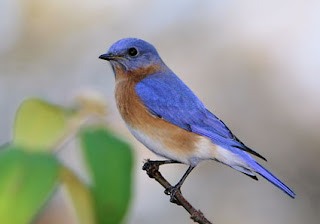Friday, August 17, 2012
My First Novel
Today I completed my first novel, The Bluebird of Happiness. From July 3rd to August 17th of this year, I underwent the longest sustained burst of creative inspiration and poetic passion that I have ever experienced as a lifelong writer, and produced a work that has far surpassed my wildest expectations.
The story had its genesis way back in 1999. At the time, it was titled The Terrible Blue and revolved around a young man named Thomas and his struggle to find meaning in what he felt to be the cold emptiness of the contemporary postmodern world. After years of false starts, changes to characters and plot, uncertainty, lack of inspiration, and occasional total abandonment, it all started coming together this year, and all the more once I began the actual writing.
Along the way, I changed the title to The Bluebird of Happiness. The reason for the new title, besides the fact that I just liked the way it sounded, had to do with the fact that I had come to see the novel's primary philosophical theme as happiness. I consider Bluebird to be a philosophical novel, meaning that it revolves around some of the deepest and most important questions we can ask about human life. If you could boil down the novel's theme to an essence, it would be something like this: Is true happiness possible for human beings?
To find out my answer, you will just have to read the book. Anyway, I don't know that I necessarily provide any definitive answer as much as I simply explore the question to its heights and depths and furthest reaches, suggest some open-ended possibilities, and leave much for the reader to ponder after the last sentence. My style of philosophical writing is not to provide tidy conclusions (because I don't know all the answers) but to get people to ask certain questions and to think for themselves.
The novel also explores themes such as beauty and love and home, and how each of these relate to each other and to happiness. One of the most important things I attempt to do in this story is to question our assumptions about and explore the possibilities of human relationships.
I should also point out that it is more than just a philosophical novel. It should certainly not be read as merely a philosophical essay in fictional form. It is meant as poetry, and should be enjoyed in many ways, for the language, the ideas, the feelings, and above all else it should simply be enjoyed as a story. The enjoyment will sometimes be painful, but even in those moments it will be, I think, beautiful and meaningful.
As I have already described, earlier this year I suddenly had a grand new vision for the story. Readers who know me personally may well wonder, while reading, why I chose the story that I did, and how much relation it bears to my actual life. With regard to the latter question, I can only echo what I said before: this is a work of fiction. The events in the story never happened. The characters in the story never existed. The novel is not a secret code to my life story, and it is definitely not a roman a clef .
When I said that I am telling my story through the novel, I did not mean that literally. If I had written The Wizard of Oz, I would also be telling my story through it. I would just be using more fantastical means to do so. In this story I am using realistic means, but that does not mean I am writing about real life in a literal sense. It is about real life only in a symbolical sense, as all literature is. It provides a shared dream through which we may interpret and understand real life. But it is still a dream, and should always be regarded as such.
So why did I choose this particular story? Well, for one thing, I'm an author and I can choose to write whatever story I want to write. It just struck me as a good story idea, and a particularly good way to explore my chosen philosophical themes. I saw in it great beauty and great power, and I hope that I have successfully conveyed my vision in these pages.
The story really came alive when I actually started writing in early July. At that point it became a true vision, overpowering me and driving me toward its realization and completion. I was under the control of the Muse, taking dictation as she revealed the true story to me, the one that I had not even guessed at during the previous 13 years of torturous evolution. I was constantly surprised and delighted at what emerged from my pen (figuratively speaking).
You will probably not understand Thomas. But that is okay. As he says of himself, "I'm not meant to be understood." And you may not even like him. He is not meant to be a hero but more of an anti-hero, although I think you will come to have a greater understanding of him, and probably even some real love for him, by the end. And that is one of the grand things about fiction. It helps us to understand, not only life, but each other.
Labels:
Novel,
The Bluebird of Happiness
Subscribe to:
Post Comments (Atom)


No comments:
Post a Comment